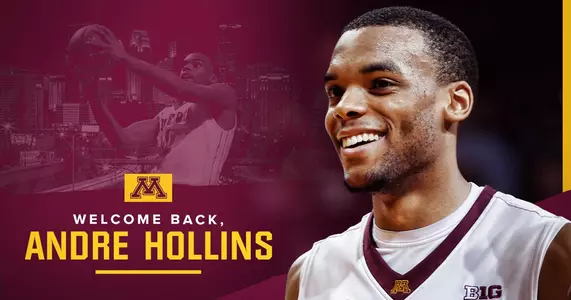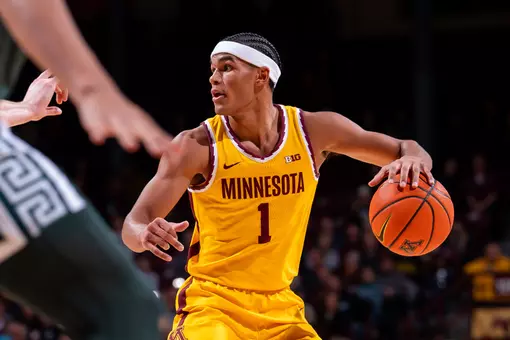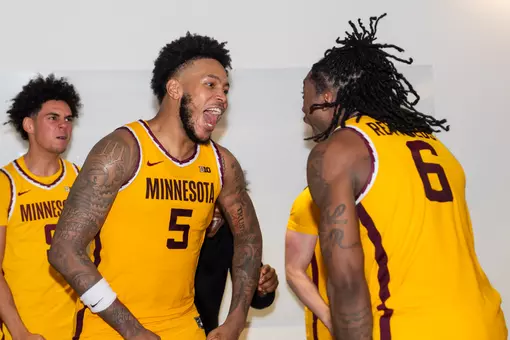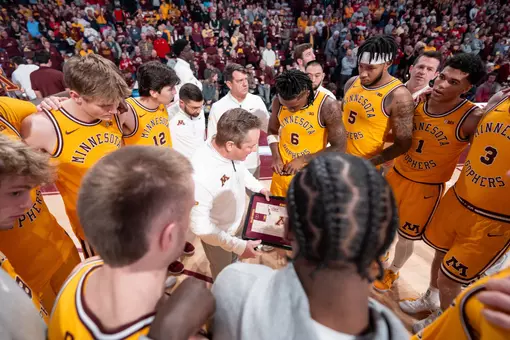University of Minnesota Athletics
Players Mentioned

Gophers Add Andre Hollins as Graduate Manager
12/13/2020 3:41:00 PM | Men's Basketball, M Club
Andre Hollins may have given up basketball as a professional athlete, but his love of basketball continues. You'll still find him at Williams Arena this year as a graduate manager for the Golden Gophers. Hollins concluded his professional career this past year and is currently working on his master's degree at the Carlson School of Management here on campus. Hollins is the second graduate manager as Jarvis Johnson is also serving in the same role. Take a look at this question/answer session as we see how this Gopher alum is doing juggling a full grad program and the men's basketball season.
GopherSports: Welcome back to the Twin Cities. How does it feel to be back at your old stomping grounds?
Andre Hollins: It feels amazing. It's the reason I came to Minnesota right out of high school. I just decided to stay actually, it's been an awesome time. I had a good time playing overseas, but I decided to come back. Like you said, it's good to be back.
 GS: You're back with the program as a graduate manager helping out the coaching staff and the players. Take us through what your role is right now with this Golden Gopher team this year.
GS: You're back with the program as a graduate manager helping out the coaching staff and the players. Take us through what your role is right now with this Golden Gopher team this year.
AH: It's actually more of a mentoring role. I'm offering myself to be a resource for the guys because I've been where they've been. The responsibilities have picked up a little bit because of COVID. We don't have as many managers this year. So, wiping the floor and making sure everyone is right on the team has kind of increased from a graduate manager perspective. I'm grateful that Coach Pitino gave me the opportunity.
GS: How did it come about? How did you and Coach Pitino come to this situation here with the club?
AH: I spoke to him about if I was going to retire or not. Seeing what the situation was going to be like for them next year. This was also pre-COVID. He said he would love to have me, but then COVID happened and we weren't sure if it was going to happen, but everything ended up working out in the end.
GS: As a mentor, what kinds of things can you bring to these guys and help them along in their college career.
AH: Obviously being one of Coach Pitino's former players, I understand his style. I'll be especially helping the freshmen out with the mental aspect and changing their mentality with it being their first time in college and playing at a high level like this. As far as the guys already there, I've been through it. I'll give them tips and tricks of the trade that kind of propelled me in my career. Like I said, just to be a resource from reading plays to anything in life honestly. Schoolwork or whatever they want to talk about, just being that resource for the guys and pay it back forward. Guys helped me, so I want to relay that information and knowledge back to them.
GS: I wanted to ask you too about being back around and what's that like? Just to be back and be able to show up every day at Williams Arena, what's that part been like?
AH: It brings back memories, it's nostalgic. It brings me back to the time that I was playing. When we took down Indiana, the practices early in the morning, and trying to pack into Austin [Hollins] car to get into Williams Arena. It's incredible and now I'm on the other side of it and looking at the game differently. Honestly, it's a great position to be in.
MG: As part of this grad manager position, you're in school and it sounds like you've got quite a class load here at the U of M.
AH: I'm back at Carlson pursuing my MBA. The class schedule is pretty rigorous. These next couple years are going to be pretty rigorous for me, but I'm making that pivot into the real world. I think that doing both of these will help me be the best that I can be in the end.
GS: You've had a great basketball career both as a college player and as pro, now you may have here in a little while an MBA and now a little coaching and mentoring experience. Where do you think this will all take you if you have your hopes realized?
AH: It's hard to say, but like I said I'm just focused on the present and focused on the now. A part of it is me giving back to the game, giving back to the players and giving back to the program that has provided me these opportunities in my life. Also bettering myself in the real world and whatever may happen, I'm going to be prepared. Just me giving back and better preparing myself in the long run for whatever comes up.
GS: Could you see yourself coaching?
AH: I could see myself coaching. Everyone has told me they see me coaching. I've had a lot of people come up to me and tell me that, but we'll see. This is a part of it, this is me trying to figure it out and what next to do.
 GS: Take us through your very stellar career at the U and all the different stops you made as a professional.
GS: Take us through your very stellar career at the U and all the different stops you made as a professional.
AH: In my first year, I went straight to Belgium. In my second year, I went to France and probably 75 percent of the season was completed and I made a transition into Germany for a month. After that in my third year, I was in Hungary. My final year, which was the most strenuous and mentally taxing one was, I was coming off an achilles injury from my year in Hungary. I started in Lithuania, then I went to Finland for weeks. After that I joined [DeAndre] Mathieu in Sweden for about a month and a half, I just decided that I shouldn't have come back over. At the beginning of that fourth year, I wasn't completely 100 percent healed from the achilles injury and then I went over too soon, and it snowballed. I decided to stop there and come back home and get reevaluated and get healthy. In doing so, I found out that I had arthritis in my hip. After that, it was a lot piling on. The signs were telling me it's time for the ball to stop bouncing. I looked far ahead in the future and I want to be able to play with my kids and still be able to play recreationally. I didn't want to put any more stress on my body and my hip, so I decided to hang it up after that.
GS: How hard was that call to make? A game you've played your whole life competitively and now you're still part of it, but not getting those juices flowing like you would maybe hope?
AH: I mean when you really think about it, it's devastating subconsciously. Doing something your entire life since you were 5-6 years old and it's the majority of the things you've done, is play basketball. It's hard for anyone whether it be sports or anything in life. That transition is mentally tough, but obviously I had a great support system and a great foundation to support me. Weighing the pros and cons and thinking about the future and knowing that basketball isn't me, it isn't who I am, it's what I do. I've only done it for a small percentage of my life. Hopefully I live until I'm 80, 90, 100 years old so when you look back basketball will only be a small fraction. Looking in the future and appreciating the game for what it was and what it has done for me. Now looking into the present, I want to give that back. I want that same pay it back forward for all the information and experiences I have learned. I want to give that back to the younger generation. I held some camps this past summer giving back to the younger generation and giving back to the program that has provided me these opportunities.
GS: You mentioned what basketball has done for you. Think about it, you were a young guy growing up in Memphis and end up in Minneapolis. You received a degree and now working on a master's degree. All kinds of different places all around the globe that basketball has been able to afford you.
AH: That's the part of it that put less of a sting on me for stopping. Just looking retrospectively back on everything that was done for me and provided me has been able to elevate me to where I am now. Just to be grateful and thankful that I was able to play. I'm thankful God gave me the talent to be able to play the game that I love. I've been to Paris, Berlin, Brussels, Vienna. Coming from Memphis, I never would've imagined going to all of these places. I'm extremely blessed, grateful and humble.
GopherSports: Welcome back to the Twin Cities. How does it feel to be back at your old stomping grounds?
Andre Hollins: It feels amazing. It's the reason I came to Minnesota right out of high school. I just decided to stay actually, it's been an awesome time. I had a good time playing overseas, but I decided to come back. Like you said, it's good to be back.
 GS: You're back with the program as a graduate manager helping out the coaching staff and the players. Take us through what your role is right now with this Golden Gopher team this year.
GS: You're back with the program as a graduate manager helping out the coaching staff and the players. Take us through what your role is right now with this Golden Gopher team this year. AH: It's actually more of a mentoring role. I'm offering myself to be a resource for the guys because I've been where they've been. The responsibilities have picked up a little bit because of COVID. We don't have as many managers this year. So, wiping the floor and making sure everyone is right on the team has kind of increased from a graduate manager perspective. I'm grateful that Coach Pitino gave me the opportunity.
GS: How did it come about? How did you and Coach Pitino come to this situation here with the club?
AH: I spoke to him about if I was going to retire or not. Seeing what the situation was going to be like for them next year. This was also pre-COVID. He said he would love to have me, but then COVID happened and we weren't sure if it was going to happen, but everything ended up working out in the end.
GS: As a mentor, what kinds of things can you bring to these guys and help them along in their college career.
AH: Obviously being one of Coach Pitino's former players, I understand his style. I'll be especially helping the freshmen out with the mental aspect and changing their mentality with it being their first time in college and playing at a high level like this. As far as the guys already there, I've been through it. I'll give them tips and tricks of the trade that kind of propelled me in my career. Like I said, just to be a resource from reading plays to anything in life honestly. Schoolwork or whatever they want to talk about, just being that resource for the guys and pay it back forward. Guys helped me, so I want to relay that information and knowledge back to them.
GS: I wanted to ask you too about being back around and what's that like? Just to be back and be able to show up every day at Williams Arena, what's that part been like?
AH: It brings back memories, it's nostalgic. It brings me back to the time that I was playing. When we took down Indiana, the practices early in the morning, and trying to pack into Austin [Hollins] car to get into Williams Arena. It's incredible and now I'm on the other side of it and looking at the game differently. Honestly, it's a great position to be in.
MG: As part of this grad manager position, you're in school and it sounds like you've got quite a class load here at the U of M.
AH: I'm back at Carlson pursuing my MBA. The class schedule is pretty rigorous. These next couple years are going to be pretty rigorous for me, but I'm making that pivot into the real world. I think that doing both of these will help me be the best that I can be in the end.
GS: You've had a great basketball career both as a college player and as pro, now you may have here in a little while an MBA and now a little coaching and mentoring experience. Where do you think this will all take you if you have your hopes realized?
AH: It's hard to say, but like I said I'm just focused on the present and focused on the now. A part of it is me giving back to the game, giving back to the players and giving back to the program that has provided me these opportunities in my life. Also bettering myself in the real world and whatever may happen, I'm going to be prepared. Just me giving back and better preparing myself in the long run for whatever comes up.
GS: Could you see yourself coaching?
AH: I could see myself coaching. Everyone has told me they see me coaching. I've had a lot of people come up to me and tell me that, but we'll see. This is a part of it, this is me trying to figure it out and what next to do.
 GS: Take us through your very stellar career at the U and all the different stops you made as a professional.
GS: Take us through your very stellar career at the U and all the different stops you made as a professional.AH: In my first year, I went straight to Belgium. In my second year, I went to France and probably 75 percent of the season was completed and I made a transition into Germany for a month. After that in my third year, I was in Hungary. My final year, which was the most strenuous and mentally taxing one was, I was coming off an achilles injury from my year in Hungary. I started in Lithuania, then I went to Finland for weeks. After that I joined [DeAndre] Mathieu in Sweden for about a month and a half, I just decided that I shouldn't have come back over. At the beginning of that fourth year, I wasn't completely 100 percent healed from the achilles injury and then I went over too soon, and it snowballed. I decided to stop there and come back home and get reevaluated and get healthy. In doing so, I found out that I had arthritis in my hip. After that, it was a lot piling on. The signs were telling me it's time for the ball to stop bouncing. I looked far ahead in the future and I want to be able to play with my kids and still be able to play recreationally. I didn't want to put any more stress on my body and my hip, so I decided to hang it up after that.
GS: How hard was that call to make? A game you've played your whole life competitively and now you're still part of it, but not getting those juices flowing like you would maybe hope?
AH: I mean when you really think about it, it's devastating subconsciously. Doing something your entire life since you were 5-6 years old and it's the majority of the things you've done, is play basketball. It's hard for anyone whether it be sports or anything in life. That transition is mentally tough, but obviously I had a great support system and a great foundation to support me. Weighing the pros and cons and thinking about the future and knowing that basketball isn't me, it isn't who I am, it's what I do. I've only done it for a small percentage of my life. Hopefully I live until I'm 80, 90, 100 years old so when you look back basketball will only be a small fraction. Looking in the future and appreciating the game for what it was and what it has done for me. Now looking into the present, I want to give that back. I want that same pay it back forward for all the information and experiences I have learned. I want to give that back to the younger generation. I held some camps this past summer giving back to the younger generation and giving back to the program that has provided me these opportunities.
GS: You mentioned what basketball has done for you. Think about it, you were a young guy growing up in Memphis and end up in Minneapolis. You received a degree and now working on a master's degree. All kinds of different places all around the globe that basketball has been able to afford you.
AH: That's the part of it that put less of a sting on me for stopping. Just looking retrospectively back on everything that was done for me and provided me has been able to elevate me to where I am now. Just to be grateful and thankful that I was able to play. I'm thankful God gave me the talent to be able to play the game that I love. I've been to Paris, Berlin, Brussels, Vienna. Coming from Memphis, I never would've imagined going to all of these places. I'm extremely blessed, grateful and humble.
Coach Medved Postgame Reaction
Wednesday, February 04
Highlights: Gophers 76, Michigan State 73
Wednesday, February 04
Ski-U-Strong
Monday, February 02
Highlights: Gophers 75, Penn State 77
Sunday, February 01








